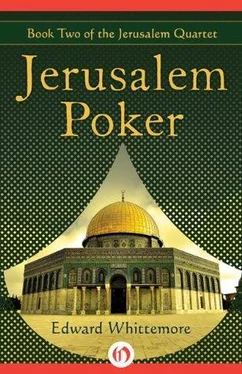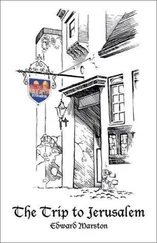Now he possessed supernatural powers of perception.
The power to sum it all up. To consider the totality of the universe and make his decision.
Nubar mixed mercury, heated mercury, mechanically repeating the master alchemist's instructions. He lowered his head into the fumes as his mind wandered through the stormy night from plots and strategems to the possibility of joining Paracelsus in an exclusive society of immortals, to Zog, to the Black Book, to the muscular stable boy with curly hair, to teetotalism, the Protocols, a primitive volcanic eye.
To vegetables and black glass and a dark cemetery in Prague, to the Theban Sacred Band and the original Bible discovered by his grandfather in the Sinai, to the moat around the castle and hygiene in general.
The Uranist Intelligence Agency and whole-wheat bread and Krk-Brac, the whole truth and the Great Jerusalem Poker Game, the Assassins and subterranean trains and the Old Man of the Mountain.
Black glass, primitive volcanic eyes. A third eye, bombs.
The Black Book. Said to have been compiled by the German secret service before the war. Said to contain the names of forty-seven thousand English homosexuals in high places, both male and female.
Entrusted to the care of Prince William of Wied when he came to Albania in 1914 to serve briefly as king. Who had the Black Book now? Could it be bought or stolen? Did Zog know where it was?
Zog. Born Ahmed Zogu of the Zogolli clan of the Mati district. Dictator of Albania for the last three years and soon to crown himself King Zog I. Sophia had worked for the liberal leader, Bishop Fan Noli, but Nubar had backed the cause of the reactionary Zog. What rewards would be his after Zog's coronation?
The Uranist Intelligence Agency. His own private network of Paracelsus agents and informers, feared throughout the Balkans and perhaps beyond. Criminals of the highest caliber making up the largest private intelligence service in the world.
The Theban Sacred Band. Three hundred heroic young warriors of noble blood in ancient Thebes, bound together by oath in defense of their ideals and their city-state, an elite homosexual brotherhood that had lived and fought in mutual passion until slaughtered by Philip of Macedonia. Could the Band be reborn in Albania? Would that be the reward he requested from Zog?
The stable boy had rolled his eyes as he lit Nubar's cigarette, forbidden to Nubar according to one of the resolutions he had made on his twenty-first birthday. But Nubar had rapidly inhaled the cigarette anyway in the dizziness of the moment, in the shadows at the back of the stables where he had slipped down onto a pile of damp hay, a sudden weight on him and a fiery pain rushing up to cleanse his body.
Mercury fumes, chronic poisoning, delirium.
Using the crucibles on his workbench, Nubar mixed equal amounts of sulphur and lead and iron and arsenic, copper sulphate and mercury and opium. Equal amounts as he poured and mixed, as he drifted above his workbench through the stormy night numbly repeating the experiment again and again in search of the unique set of circumstances, in search of Paracelsus and his secret society of immortals.
While in a dark cemetery in Prague aging men with long thick noses bent over a little boy, holding him tightly and taunting him, their white beards matted and filthy, the Old Man of the Mountain slowly thrusting a dull rusted knife between the little boy's legs.
Nubar shuddered and found himself standing in front of a military formation, three hundred handsome young men at attention. They wore the helmets and swords and tunics of ancient Greece, identical in cut and color. Courageous invincible warriors waiting for him to address them, to lead them again into victorious battle as only he could do, their immortal commander Parastein von Ho von Heim, Celsus of Bombastus, the incomparable von Wallenbomb.
The handsome young warriors cheered him, holding up their clenched fists in salute. Nubar nodded solemnly and waved for silence. With a flourish he slipped his right hand around his right buttock. The lines and ranks watched him breathlessly.
Wild cheering erupted. Nubar grinned and nodded. For a moment he was able to thrust his whole fist in up to the wrist. The massed young warriors were screaming ecstatically. The muscular stable boy knelt beside him, waiting with bowed head. Nubar carefully wiped his fist on the boy's curly hair.
Whole-wheat bread and vegetables, curly hair and bombs.
Fumes. More mercury fumes and a moat, hygiene in general and the Assassins and subterranean passages. Brac. A dull rusted knife. Explosions.
And across the sea a poker game being played by three ruthless criminals for control of Jerusalem. The Sinai Bible discovered by his grandfather, still buried in Jerusalem, now rightfully his.
The original Bible, the philosopher's stone, and a secret society in Jerusalem plotting against him to get it.
A secret triad of players trying to steal what was his.
Through his third eye Nubar saw it all clearly, through his obsidian eye of primitive glass. Nothing could escape his black volcanic eye on that dark stormy night of Epiphany.
Nubar fell forward. His head struck the boards of the workbench and rested there, his poisoned delirious brain adrift in visions of immortality and the Sinai Bible.
The next evening when they sat at dinner, the Mass in B Minor booming forth from the organ, Nubar was unusually subdued.
I've had a few things checked into, said Sophia. I thought you might be interested in the facts that turned up.
What facts, Bubba?
For one, the English diplomat and autobiographical novelist known as Sir John Retcliffe. His real name was Hermann Goedsche, a former German postal clerk. He later admitted Biarritz was a total fabrication, including of course the chapter set in Prague.
Nubar smiled faintly.
What about Osman-Bey?
An even worse fake. He also used the name Kibridli-Zade, but his real name was Millinger, a crook of Jewish origins from Serbia. He wrote in German and published in Switzerland, peddling his anti-Semitic works door to door from Constantinople to Athens. He was expelled from every country he ever entered for every kind of swindle, always on the move and always being arrested. His career began in 1879 with his expulsion from Venice, and ended with his death in 1898. The Russian secret police sent him to Paris with four hundred rubles to uncover evidence of a Jewish plot to take over the world. He used the money to manufacture World Conquest by the Jews and have it published.
Ritual murder of Christian boys by rabbis? murmured Nubar vaguely.
The most recent documentation of that comes from a Roman Catholic priest of Polish extraction who was defrocked for a variety of offenses, ranging from embezzlement to rape. In 1876 he wrote a book on the subject, then made an offer to some leaders of Russian Jewry to publish a refutation of his own book if they paid him. He also offered to lecture against his book if they paid him a little more. Don't you understand what kind of company you're keeping, Nubar?
The whole truth is to be found in this formula, murmured Nubar, which provides the key to a host of disturbing and seemingly insoluble riddles.
I know. The line refers to the Protocols of the Elders of Zion and was written in Paris by one Rachkovsky, head of the Okhrana outside of Russia. He spent his time writing attacks on everyone and then answering his own attacks, all under names of real people. He also had the habit of fabricating nonexistent organizations, issuing pamphlets under their names and then refusing those same pamphlets, using the names of other nonexistent organizations. And so on endlessly. Can't you really see what this kind of thing leads to?
Читать дальше












